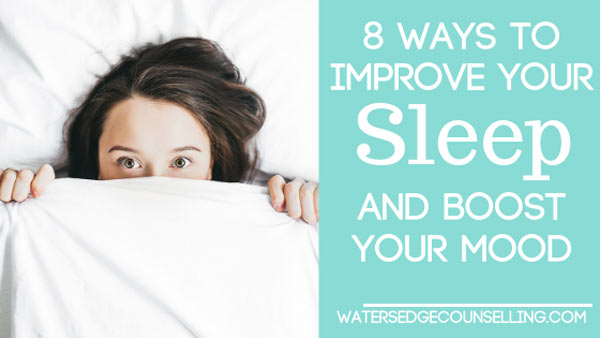
This post is a condensed version of the article, ‘The Impact of Sleep on Mood and Mental Well-Being’ by the Sleep Help Institute. Read the full, original article here.
Have you ever woken up early to start a work week and experienced a profound “case of the Mondays”? That feeling of drowsiness, lack of energy, irritability, and overall malaise that comes with the start of a new work week.
Or has a lack of sleep ever caused you to uncharacteristically snap at a friend or family member over some minor issue? If so, you know from experience what science is now confirming: sleep has a huge impact on our mood and mental well-being.
In both the short and long term, the amount and quality of our sleep can play a huge role in our mental health including how we feel and how we act toward other people. Even just one night of insufficient sleep can bring on stress and a tendency to become easily frustrated.
Continued or chronic sleep deprivation can have even more profound effects, significantly impacting a person’s overall mood and in some cases leading to issues like depression and anxiety. More and more research is establishing links between depression and insomnia, and because conditions like depression can make it harder to fall asleep, these issues often become part of a self-perpetuating cycle.
Both sleep and mental health are big, complex topics that still require years of dedicated research to better understand. Nevertheless, the more we learn, the more we find that sleep has to be considered a key part of a person’s wellness, which includes their physical and emotional health.
Improving Sleep Through Sleep Hygiene
Sleep research has increasingly shown that it’s easier to fall asleep and stay asleep if you build the right habits. In general, this is referred to as sleep hygiene, and while it can take some effort and planning, it can really pay off with improving your overall sleep routine. There is no single “best” routine for sleep hygiene, so it’s OK to make some modifications based on your own needs and preferences, but general principles of sleep hygiene include:
- Go to bed and wake up at consistent times:even during vacations or on weekends, it’s advisable to try to go to bed and wake up at the same time. This can help your body adjust to a normal schedule that ideally helps your circadian rhythm be in tune with the local daylight hours.
- Follow the same routine before bed:the ideal pre-sleep routine differs for each person, but try to go through the same set of steps every night. This helps strengthen the associations in your mind of this routine and sleeping.
- Limit daytime naps:napping for too long or too late in the day can make it much harder to fall asleep when you need to at night.
- Build a better bedroom:think about all the aspects of your sleep environment—light, sound, smells, your mattress, bedding, temperature etc., and work to make your bedroom the most comfortable place possible. If needed, consider products like a new mattress, blackout curtains, a white noise machine, or whatever else is necessary to limit the things that could disrupt your sleep.
- Limit screen time:unfortunately, the light and stimulus from your phone (or tablet or laptop) can make it much harder for your mind and body to smoothly transition into sleep. Try to limit screen time leading up to bed and to avoid using these devices in bed.
- Find ways to relax:it may be deep breathing or listening to calming music or using aromatherapy, but it can be extremely useful to find a way to relax as you’re going to bed. You also likely want to strategize about how you can stay calm if you are struggling to fall asleep or if you wake up unexpectedly in the night.
- Build in time for exercise:daily exercise can be beneficial both for improving your sleep and improving your mood and mental health. It doesn’t have to be Olympic-level training, but taking walks or having some regular workouts can dramatically improve your health in a multitude of ways.
- Keep a sleep diary:it may be helpful to track what is working and not working for you with regard to your sleep as well as your mood. In a sleep journal, you can take note of your routine, bedtime, wake up time, and how you feel the next day. If you do need to work with a counsellor or doctor, this can be very useful information to help them understand your sleep habits and problems.
Do you struggle to get a good night’s sleep? Are you looking for healthy ways to boost your mood? Here’s what you need to do: Contact Colleen on 0434 337 245 or Duncan on 0434 331 243 for a FREE 10 minute consultation on how we can best help you or book online.
Leave a Reply